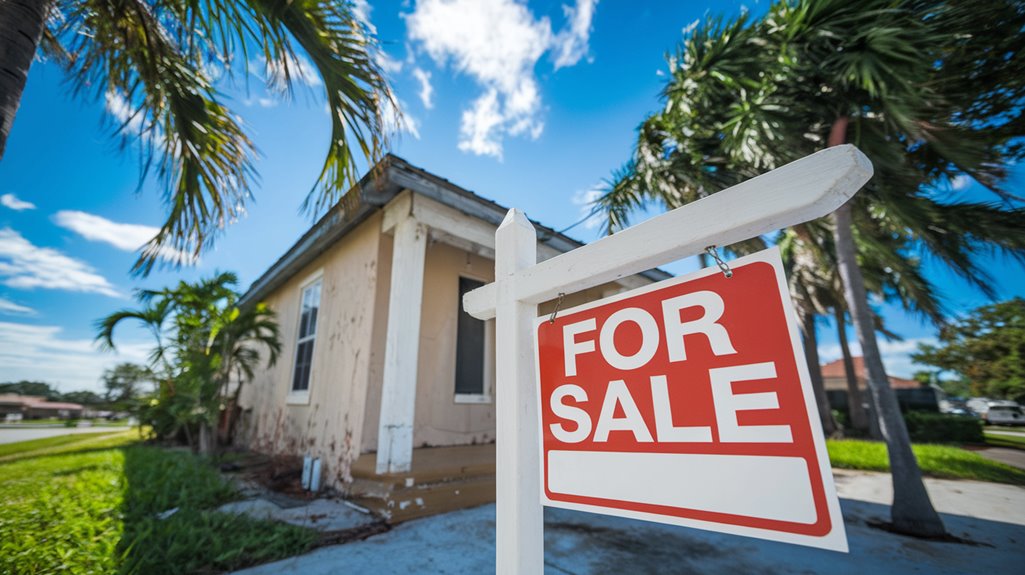Selling a House in Foreclosure in Florida
Foreclosure is a challenging and stressful situation that many Florida homeowners face today. You might feel overwhelmed, worried about your credit score, and uncertain about your financial future. Time pressure and mounting debts can create sleepless nights for families.
The bank’s threatening letters, constant calls from creditors, and the fear of losing your home are overwhelming. You might think foreclosure is inevitable and feel powerless to stop it. The stress affects your work, family life, and mental well-being.
You can sell your house in Florida during foreclosure through pre-foreclosure sales, short sales, or traditional market sales. This guide provides practical steps, legal considerations, and timing strategies to help you navigate the foreclosure sale process effectively.
Key Takeaways
- Homeowners can sell their house in pre-foreclosure to avoid complete foreclosure and minimize credit damage.
- Listing with a real estate agent requires ongoing mortgage payments and may take longer to close.
- Opting for a direct sale to cash buyers allows for quicker transactions and as-is purchases.
- It’s important to price the home competitively based on property condition and market comparables to attract buyers.
- Consulting legal and real estate professionals is essential to navigate the complexities of foreclosure sales in Florida.
What is Foreclosure in Florida?

Foreclosure happens when Florida homeowners cannot pay their mortgage, and banks take back their homes. You will receive a notice of default from your bank first. The lender starts legal actions to claim your property through the court system. If you miss several payments, your home might face a court-ordered sale. This process can damage your credit score for many years. You can try to work with your lender to find payment solutions. We recommend exploring all options before the foreclosure becomes final. The bank must follow strict legal steps during this entire process.
Since Florida law protects homeowners, you have rights during foreclosure proceedings. If you act quickly, you might save your home through loan modification. A short sale could help you avoid the worst effects of foreclosure. You should seek legal advice to understand your specific situation better. While foreclosure seems overwhelming, many solutions exist to help struggling homeowners. Most Florida properties take 720 days to foreclose from the initial notice through the final sale.
Types of Foreclosure in Florida
When facing foreclosure in Florida, it’s crucial to understand the different types that can affect your situation. You’ll encounter judicial foreclosure, non-judicial foreclosure, and strict foreclosure, each with its own legal processes and implications. Knowing these distinctions can empower you to make informed decisions as you navigate this challenging time.
Judicial foreclosureon
Judicial foreclosure is a legal process where lenders must file a lawsuit to recover property. This procedure follows specific steps under court supervision in Florida.
You must understand each phase of the foreclosure to protect your property rights effectively. The process begins when a lender sends a notice of default to borrowers.
| Step | Duration | Key Action |
|---|---|---|
| Notice of Default | 30 days | Lender notifies borrower |
| Filing a Lawsuit | Varies | Lender files for foreclosure |
| Court Proceedings | Several months | Court hears the case |
| Judgment Entered | Varies | Court issues foreclosure order |
| Sale of Property | 20-30 days | Auction or sale occurs |
If homeowners respond quickly to the notice, they might prevent further legal action. We recommend seeking legal counsel to explore available options during this time.
The court will review all evidence before making a final decision. When the judge issues a foreclosure order, the property moves toward auction.
Since this process involves multiple steps, homeowners should track each deadline carefully. You can work with housing counselors to understand your rights better.
If you face foreclosure, alternatives like loan modification or short sale might help. The timeline for completion depends on various factors and court schedules.
Working with cash buyers can provide a quick solution to avoid the lengthy judicial foreclosure process and protect your credit score.
Non-judicial foreclosure
Non-judicial foreclosure in Florida relies on court involvement for all property foreclosures. The state requires judicial oversight to protect borrower and lender rights.
You need to understand that Florida only permits judicial foreclosures by law. This requirement means lenders must file lawsuits to begin the foreclosure process.
If you face foreclosure in Florida, you will go through the court system. The judge oversees the entire process from start to finish.
We recommend working with legal professionals who understand Florida’s foreclosure laws. This partnership can help protect your rights during the foreclosure proceedings.
You can explore several options before your case reaches the courts. Solutions may include loan modifications, short sales, or deed-in-lieu arrangements.
Lenders must follow strict legal procedures in Florida’s judicial system. These rules give homeowners time to respond and defend their property rights.
If you receive foreclosure notices, seek immediate legal guidance. This action will help you understand your options under Florida law. Understanding your property’s joint tenancy rights can significantly impact your foreclosure defense strategy.
Strict foreclosure
Strict foreclosure permits lenders to claim property ownership without going through standard court procedures.
This process differs from regular foreclosure methods in Florida’s legal system. Lenders can use strict foreclosure when borrowers have no equity in their homes. You must meet specific requirements before starting a strict foreclosure action. The lender will notify homeowners about their loan default status first.
If borrowers fail to fix their default, lenders can take immediate ownership. While lenders benefit from faster property recovery, homeowners face limited options. You should seek professional guidance to understand your legal rights fully. This approach saves time compared to traditional foreclosure methods.
When strict foreclosure begins, borrowers receive a strict timeline to resolve payments. We recommend careful review of all foreclosure documents from your lender. If you receive a strict foreclosure notice, quick action becomes essential. Professionals can explain the available options to protect your interests. Homeowners with a spouse in a nursing home should verify if they need spousal legal consent before proceeding with any foreclosure-related property decisions.
Ways to Sell a House in Foreclosure
When you’re facing foreclosure, exploring your selling options is crucial for minimizing losses. You can consider pre-foreclosure sale options or the short sale process in Florida, both of which can help you navigate this challenging situation. Understanding how to price your foreclosure home and the necessary legal requirements will ensure you make informed decisions throughout the process. Selling your foreclosure property as-is to investors can result in closings within 7-14 days without traditional financing complications.
Pre-foreclosure Sale Options
Pre-foreclosure sales help homeowners avoid the complete foreclosure process in Florida. You have several options to sell your property before foreclosure proceedings begin. We understand that making mortgage payments can become difficult during financial hardship. This situation requires quick action to protect your interests and credit score.
If you list with a real estate agent, you must continue paying the mortgage. While traditional sales might fetch better prices, they often take longer to close. You can explore direct sales to cash buyers for faster transactions. So, companies like cash home buyers offer quick closings without repairs or contingencies.
When you choose cash buyers, the process becomes simpler and faster. These buyers will handle paperwork and closing costs. If your property needs repairs, cash buyers will still purchase it as-is. This approach eliminates the need for costly home improvements.
You should act quickly to maximize your property’s value before foreclosure. We recommend exploring all available options to make an informed decision. Since timing matters, working with experienced buyers can ease your stress. The reduced contingencies associated with cash buyers make them particularly attractive for distressed properties facing foreclosure.
Short Sale Process in Florida
A short sale allows homeowners to sell their property for less than the mortgage balance. If you face foreclosure, this option can help protect your financial future. You must get your lender’s approval before starting this process. This solution helps prevent foreclosure marks on your credit report.
You can benefit from possible debt forgiveness on the remaining mortgage balance. When lenders agree to a short sale, they often waive the difference. If the IRS forgives your debt, you might need to pay taxes on that amount. The process takes longer than a standard home sale.
We recommend working with a skilled real estate agent for better results. Your agent should have experience with short sale transactions. Since each lender has different rules, you must understand their requirements first. If you meet all conditions, this choice could save your credit score. Unlike properties in summary administration, which require estates under $75,000, short sales have no maximum value limits.
How to Price a Foreclosure Home
Pricing a foreclosure home requires careful market analysis and strategic planning. You need to consider foreclosure homes typically sell at lower prices than regular properties. We recommend researching comparable foreclosed properties in your neighborhood for accurate pricing. A professional appraiser can help determine the right market value for your property.
This approach should account for the home’s square footage and current condition. If you price too high, potential buyers will look elsewhere. When setting the final price, you must factor in repair costs and maintenance issues.
You can analyze recent sales data to find the sweet spot for pricing. The location and neighborhood trends will influence your property’s market value. A real estate agent with foreclosure experience can provide valuable pricing insights.
We suggest being flexible with your pricing strategy as market conditions change. If the house doesn’t attract buyers, you may need to adjust the price. The final sale price should balance between market expectations and your financial goals.
The property’s condition plays a crucial role in determining its worth. So, you must document all repairs needed before setting the price. You will achieve better results by staying competitive with similar foreclosed properties. Remember that home value ultimately depends on what potential buyers are willing to pay in the current market.
Legal Requirements and Documentation
Legal requirements and documentation for selling a foreclosure home include specific mandatory paperwork. You must collect essential legal documents before starting the sale process. The deed stands as your primary proof of property ownership. Your mortgage statements show the payment history and current loan status. We recommend organizing all communications from your lender in one file. This documentation helps create a clear paper trail for buyers. If you receive a notice of default, keep it with other foreclosure papers.
A real estate attorney can review these documents for accuracy. You should verify all information before submitting any paperwork. When working with cash buyers, the process becomes more straightforward. They often handle complex legal requirements on your behalf. If everything is in order, the sale can move forward quickly. This approach helps avoid common delays in foreclosure sales. Professional buyers ensure compliance with local real estate laws. Their expertise streamlines the documentation process for sellers. A residential property disclosure must be completed to inform potential buyers of any known issues with the home.
Avoiding Common Foreclosure Sale Mistakes

When facing foreclosure, it’s crucial to work closely with your lender to understand your options and avoid costly mistakes. Knowing your rights and managing the timeline effectively can make all the difference in the outcome of your sale. Stay informed and proactive to navigate this challenging process successfully. Working with a cash buyer solution can provide immediate funds to help resolve financial challenges and avoid further foreclosure complications.
Working With Your Lender
Working with your lender is essential to navigate the foreclosure process successfully. You should start a conversation with your lender about possible solutions. Your lender can explain various options like loan changes or short sales. If you understand these choices better, you will make smarter financial decisions.
When you talk to your lender, ask them to clarify any confusing terms. We recommend keeping detailed records of all your discussions with the lender. This documentation will protect your interests throughout the process.
Your lender wants to avoid foreclosure because it costs them time and money. So, they will likely work with you to find solutions. If you maintain regular contact, your chances of reaching an agreement improve.
This partnership can help you explore alternatives to foreclosure. While the situation may seem difficult, a positive approach will yield better results. You must take action quickly instead of waiting for problems to worsen.
Just like an estate executor’s role, working with your lender requires clear communication and careful documentation of all interactions.
Understanding Your Rights
Rights are legal protections that help homeowners during the foreclosure process. You must learn about these protections to protect your home and finances. The federal government offers several key safeguards for struggling homeowners. You can request a loan modification to make payments more affordable. If the process seems unfair, you have the right to challenge it.
When you receive legal notices, take action right away. If you ignore foreclosure notices, you might lose your home forever. This situation requires quick and careful attention to all deadlines. Legal experts can explain your options in simple terms.
So, you should contact a housing counselor or lawyer for guidance. We recommend keeping records of all communications with your lender. Your quick response to notices will protect your rights as a homeowner.
If you follow the proper steps, you can better defend your property. While the process seems complex, clear understanding leads to better choices. Since each state has different rules, local legal advice matters most.
Getting a clear title search helps identify any existing liens or legal claims that could affect your property’s sale during foreclosure.
Timeline Management
Timeline management requires careful attention to deadlines during the foreclosure process. You must contact your lender and real estate agents without delay. This immediate action will help prevent costly mistakes in the process. Your real estate team needs regular updates about the current situation. We recommend creating a detailed schedule with all important dates. If you miss key deadlines, you could face serious consequences. The foreclosure auction date should be clearly marked on your timeline.
You should track all paperwork submissions and response windows carefully. Since time is critical, quick decisions will improve your selling chances. When you stay organized, the process becomes more manageable. So, you must act quickly to explore all available options. If you wait too long, your choices may become limited. This proactive approach will reduce stress and uncertainty. Your timeline should include buffer periods for unexpected delays. Cash home buyers can expedite the process by eliminating traditional financing delays and lengthy closing procedures.
Stop Foreclosure Today: Sell to Greg Buys Houses

Greg Buys Houses helps homeowners avoid foreclosure through quick cash home purchases. You can escape the stress of foreclosure by selling your house to our company. We make the home-selling process simple and fast for distressed homeowners. If you choose to work with us, you won’t need to make any repairs. This solution eliminates the need for traditional home showings and lengthy sale processes.
Since we buy properties as-is, you can save money on renovations and upgrades. Your mortgage payments will stop after we complete the quick closing process. If you act now, you can prevent foreclosure from damaging your credit score.
We understand the challenges of facing foreclosure and offer practical solutions. So, you can start fresh without the burden of a troubled mortgage. This opportunity allows you to regain control of your finances quickly. Our team uses a secure escrow account to protect your funds throughout the sale process.

